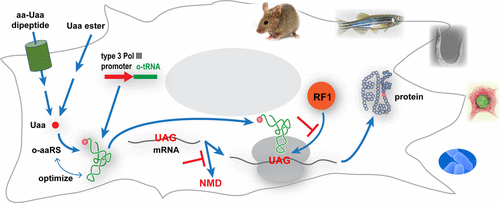当前位置:
X-MOL 学术
›
Acc. Chem. Res.
›
论文详情
Our official English website, www.x-mol.net, welcomes your feedback! (Note: you will need to create a separate account there.)
Engineering the Genetic Code in Cells and Animals: Biological Considerations and Impacts
Accounts of Chemical Research ( IF 18.3 ) Pub Date : 2017-10-06 00:00:00 , DOI: 10.1021/acs.accounts.7b00376 Lei Wang 1
Accounts of Chemical Research ( IF 18.3 ) Pub Date : 2017-10-06 00:00:00 , DOI: 10.1021/acs.accounts.7b00376 Lei Wang 1
Affiliation

|
Expansion of the genetic code allows unnatural amino acids (Uaas) to be site-specifically incorporated into proteins in live biological systems, thus enabling novel properties selectively introduced into target proteins in vivo for basic biological studies and for engineering of novel biological functions. Orthogonal components including tRNA and aminoacyl-tRNA synthetase (aaRS) are expressed in live cells to decode a unique codon (often the amber stop codon UAG) as the desired Uaa. Initially developed in E. coli, this methodology has now been expanded in multiple eukaryotic cells and animals.
中文翻译:

工程化细胞和动物的遗传密码:生物学考虑和影响
遗传密码的扩展允许将非天然氨基酸(Uaas)特异地掺入到活生物系统中的蛋白质中,从而能够在体内选择性地将新特性引入靶蛋白中,以用于基础生物学研究和新生物学功能的工程化。在活细胞中表达包括tRNA和氨酰基-tRNA合成酶(aaRS)的正交成分,以解码唯一的密码子(通常为琥珀终止密码子UAG)作为所需的Uaa。该方法最初在大肠杆菌中开发,现已扩展到多种真核细胞和动物中。
更新日期:2017-10-06
中文翻译:

工程化细胞和动物的遗传密码:生物学考虑和影响
遗传密码的扩展允许将非天然氨基酸(Uaas)特异地掺入到活生物系统中的蛋白质中,从而能够在体内选择性地将新特性引入靶蛋白中,以用于基础生物学研究和新生物学功能的工程化。在活细胞中表达包括tRNA和氨酰基-tRNA合成酶(aaRS)的正交成分,以解码唯一的密码子(通常为琥珀终止密码子UAG)作为所需的Uaa。该方法最初在大肠杆菌中开发,现已扩展到多种真核细胞和动物中。



























 京公网安备 11010802027423号
京公网安备 11010802027423号